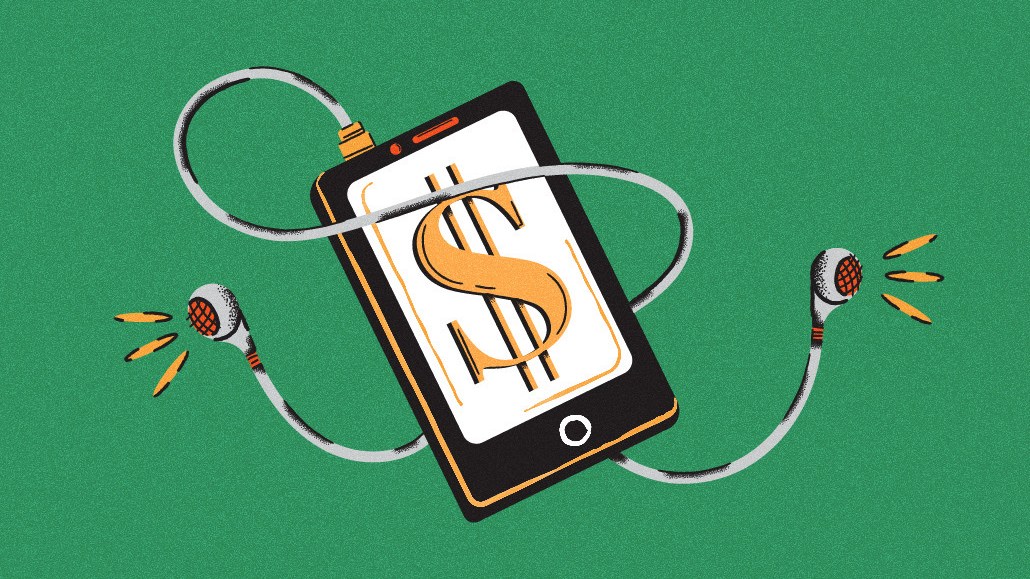Secure your place at the Digiday Publishing Summit in Vail, March 23-25
As AI and influencers shape audio, agencies focus on targeting and privacy issues

With more use of artificial intelligence and influencers in podcasting, there are greater possibilities in targeting and personalization of ads — but this might also bring up privacy and brand safety concerns down the line.
From tools that use AI-generated voices and ads to contextual targeting, agencies are exploring new solutions, such as audio management platform Sounder, for their podcast ad campaigns. The result is more ad format options that rely on AI to produce audio ads, host-read sponsorships and personalized campaigns using custom generative AI voices.
Kristen Coseo, director of podcast and digital audio strategy at independent agency Ocean Media, said AI software like Sounder opens the door to running “contextually relevant campaigns with the added layer of brand suitability. Like all AI tech, it’s a work in progress and getting better and smarter with time.”
Publishers are using AI to help generate ads and tailor them on an individual listener level, and the algorithms can also help influencers and hosts determine the most relevant content for their shows, explained Katie Kelly, director of programmatic at Code3.
“Recent studies show that 60% of people have bought something they have heard from a podcast ad,” Kelly said. People have “more empathy and connection” when listening to audio compared to visual media, developing trust and consideration when products are promoted. Host-read ads in particular are less disruptive than an outside voice being injected into a show, Kelly added.
Host-read ads are integrated into shows and in some cases provide better results than programmatic ads. Rob Silver, evp and head of media at Razorfish, said the agency has seen brands leverage the trust and connection host-read ads establish with audiences. “We have seen this in our campaign performance with host-read ads outperforming programmatic [pre-recorded] in key brand metrics, especially in consideration and favorability metrics,” Silver said.
However, with platforms like Spotify and other ad tech players experimenting with using AI to produce ads, there are potential copyright and privacy issues. Ian Clark, media director of Exverus Media, said the agency primarily advertises directly through Spotify and suggested that audio could take a page from connected TV’s playbook.
“[With Spotify experimenting] with AI-generated ad reads based on hosts’ voices, this runs into all kinds of copyright and privacy issues,” Clark said. “I think a better application would be algorithmic audience targeting, personalization and data collection, much like in CTV.”
Spotify recently introduced AI technology trained using a person’s voice, AI DJ, and in May was reportedly exploring using podcasters’ synthetic voices for making ads, according to Bill Simmons, founder of “The Ringer” podcast.
Additionally, Claire Russell, head of media at Fitzco, noted that there have been challenges in scaling audio ads. Russell said with just over half of ads being host-read in the industry, advertisers have been seeing those numbers “shrinking over the last three years.”
“There are additional considerations around if the host-read ad is baked in or pre-recorded that affect relevancy too — if it’s baked into the podcast and you have a seasonal message, it’s possible someone may listen to that months later when it’s not as relevant,” Russell said.
More traditional ad campaigns may offer more scale, but it comes at the expense of authenticity. But as Russell explained, recently there have been more advancements in podcast measurement that allow agencies to compare effectiveness between the two types of campaigns as they experiment with new tools.
“These are often realities that have a strong pull in the decision-making process versus effectiveness alone,” Russell said.
More in Media Buying

The agency holdcos have an AI story, but not an AI business model
The holdco platforms need to deliver on the promises made — and so far, clients aren’t seeing it.

Media Buying Briefing: The Big Three’s pieces are in place – let’s see who wins
With WPP’s strategic transformation announced last week, the battle for holding company supremacy could turn out differently than it’s been the last five years.

Bold Call: AI compute costs are the future of the upfront… and principal media
Agencies have a compute probable. As AI takes over more of their day-to-day work, its introducing a new and deeply unpredictable cost center.








